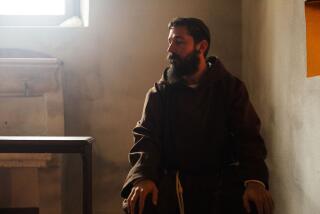Bells Sound at Ordination of First Juaneno
- Share via
The bells of Mission San Juan Capistrano rang loudly Saturday to announce that for the first time in its 210-year-history, one of its own--a San Juan Capistrano native--was ordained there.
The event, called a “very historic occasion” by the auxiliary bishop of Orange, was witnessed by descendants of the city’s oldest families.
What they saw was a series of firsts.
Brother James Joseph Nieblas, 39, became Father James Joseph Nieblas in the seven-domed parish church opened last year: the first ordination in the new church of the mission.
Nieblas, half Mexican and half Indian, also became the first Juaneno Indian to be ordained.
“I’m very proud of being the first,” Nieblas said afterward. “I was born here. This is the classroom I learned in,” he said, standing in the room he remembered entering as a third-grader.
“For me, as a priest, I’ve learned my knowledge not only from books, but it’s also been the people who have taught me to be compassionate and understanding.”
Watching the ceremony was the grandmother who raised him, Buena Ventura Garcia Nieblas, 87, a descendant of the Indians who helped build the mission, according to Jerome S. Nieblas, another of her grandsons and the mission’s purchasing agent.
Wearing a white shawl and a black hat, she sat in her wheelchair in the front row of the parish. “I knew she would be here. She’s waited for this all these years,” said a woman sitting in the audience of hundreds.
Founding Families Watched
Members of other founding families, including Oyharzabel, Belardes, Garcia, Rios, Soto and Yorba, also witnessed the ordination by the Most Rev. John T. Steinbock, auxiliary bishop of the Diocese of Orange.
And they heard the man they knew as “Brother Jimmy” sing “Ave Maria,” dedicating it to his grandmother and the parish community he called “my family.”
Nieblas, son of James Nieblas Sr. and Louise Faye Soto McGanogle, grew up with his paternal grandparents in the house that once was known in the city as “Las Rosas Spanish Restaurant,” where a former bank building now stands. He attended the Old Mission School, graduated from Don Bosco Technical Institute in Rosemead--where he now teaches--and belongs to the Society of St. Francis de Sales.
Also watching the ceremony Saturday was Teeter Marie Romero, 52, a first cousin of Nieblas and another descendant from a rich part of San Juan Capistrano’s history: the Juaneno Indians who once populated the area. Romero wore a leather dress, boots and a colorful headband of Indian jewelry.
Actually, the garb was not typical of the Juaneno women, who painted part of their bodies and wore a type of grass skirt. “If I wore a Juaneno typical dress, they wouldn’t let me in,” Romero quipped.
“We’ve come a long, long way,” Romero said. “Local boys finish high school, go on to college. Now, Brother Jimmy is becoming a priest. We have doctors. My son graduated from two universities. We’re in every walk of life.”
The San Juan Capistrano Mission and its founder, Father Junipero Serra, have been the subject of some controversy among Indians who have protested the proposed canonization of Serra. Some have accused Serra and the Franciscans of brutality toward California Indians.
But the Juanenos “don’t have that type of feeling” toward Serra, Romero said. Jerome Nieblas noted they have “a niche” in the parish for a statue of Serra once he is proclaimed a saint, expected in September of 1987.
“Father Serra brought our people to this day. I think Serra would be proud,” he said. The canonization, he said, has “the full support and backing of the Juaneno people.”
More to Read
Sign up for Essential California
The most important California stories and recommendations in your inbox every morning.
You may occasionally receive promotional content from the Los Angeles Times.












